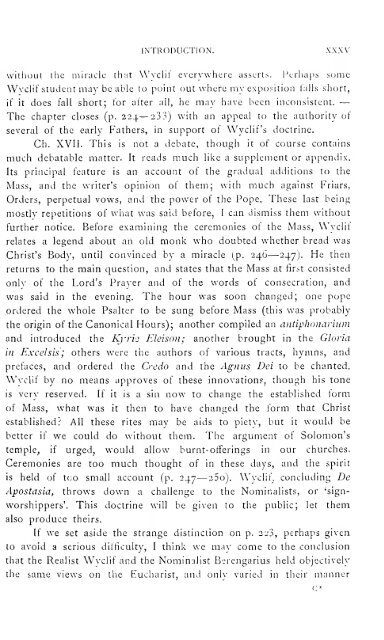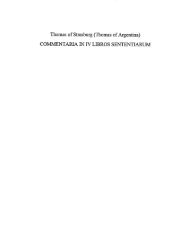You also want an ePaper? Increase the reach of your titles
YUMPU automatically turns print PDFs into web optimized ePapers that Google loves.
INTRODUCTION. XXXV<br />
without the miracle that Wyclif everywhere asserts. Perhaps some<br />
Wyclif stu<strong>de</strong>nt may be able to point out where my exposition falls short,<br />
if it does fall short; for after all, he may have been inconsistent. —<br />
The chapter closes (p. 224 — 233) with an appeal to the authority of<br />
several of the early Fathers, in support of Wyclif's doctrine.<br />
Ch. XVII. This is not a <strong>de</strong>bate, though it of course contains<br />
much <strong>de</strong>batable matter. It reads much like a supplement or appendix.<br />
Its principal feature is an account of the gradual additions to the<br />
Mass, and the writer's opinion of them; with much against Friars,<br />
Or<strong>de</strong>rs, perpetual vows, and the power of the Pope. These last being<br />
mostly repetitions of what was said before,<br />
further notice. Before examining the ceremonies of the Mass, Wyclif<br />
relates a legend about an old monk who doubted whether bread was<br />
I can dismiss them without<br />
Christ's Body, until convinced by a miracle (p. 246 — 247). He then<br />
returns to the main question, and states that the Mass at first consisted<br />
only of the Lord's Prayer and of the words of consecration, and<br />
was said in the evening. The hour was soon changed; one pope<br />
or<strong>de</strong>red the whole Psalter to be sung before Mass (this was probably<br />
the origin of the Canonical Hours); another compiled an antiphonarium<br />
and introduced the Kyrie Eleison; another brought in the Gloria<br />
in Excelsis; others were the authors of various tracts, hymns, and<br />
prefaces, and or<strong>de</strong>red the Credo and the Agnus<br />
Dei to be chanted.<br />
Wyclif by no means approves of these innovations, though<br />
his tone<br />
is very reserved. If it is a sin now to change the established form<br />
of Mass, what was it then to have changed the form that Christ<br />
established? All these rites may be aids to piety, but it would be<br />
better if we could do without them. The argument of Solomon's<br />
temple, if urged, would allow burnt- offerings in our churches.<br />
Ceremonies are too much thought of in these days, and the spirit<br />
is held of too small account (p. 247 — 25o). Wyclif, concluding De<br />
Apostasia, throws down a challenge to the Nominalists, or 'signworshippers'.<br />
This doctrine will be given to the public; let them<br />
also produce theirs.<br />
If we set asi<strong>de</strong> the strange distinction on p. 2i»3, perhaps given<br />
to avoid a serious difficulty, I think we may come to the conclusion<br />
that the Realist Wyclif and the Nominalist Berengarius held objectively<br />
the same views on the Eucharist, and onlv varied in their manner<br />
c*

















